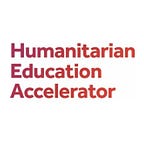Announcement of HEA COVID-19 Challenge Finalists!
Following the HEA’s first virtual bootcamp — which saw 13 successful teams come together for an intensive week of collaborative learning — UNHCR, Education Cannot Wait, the EdTech Hub and Global Innovation Exchange (GIE) are pleased to announce the following three teams have been selected as finalists for the HEA COVID-19 Challenge:
Each of these teams will receive up to 60,000 USD in financing to assist with scaling their programme and extending access to their solutions in refugee-hosting contexts. The three teams will also receive further mentorship support from HEA mentors and partners, including each participating in tailored ‘design sprints’ — facilitated by IDEO.org — to refine how they will scale (find out more about what a design sprint looks like here).
We are excited to be working with these inspiring teams as they scale and will be sharing blogs, tools and interviews here on the Learning Series as we follow their scaling journeys, interrogate common challenges and celebrate achievements over the coming months.
In the meantime, here’s a short introduction to the teams and what made their solutions stand out to the HEA selection panel:
- Amal Alliance and Ustad Mobile
Amal Alliance and Ustad Mobile entered our week-long virtual bootcamp as two separate teams but left having formed a dynamic new partnership, which marries Amal Alliance’s Colors of Kindness Podcast with Ustad Mobile’s innovative mobile learning App.
Colors of Kindness is a podcast that seeks to bridge the learning gap and provide psychosocial support to children and their families during and after the COVID-19 pandemic, through social emotional learning (SEL) centered content that enhances well-being. The Ustad Mobile app is an innovative mobile Learning Management System which can be used on or offline, and enables users to share content with each other offline directly from phone to phone. The app will be improved based on feedback during the HEA and a new version will be built to run on $11 feature phones to reach the widest possible audience.
What stood out to the HEA selection panel? Amal Alliance and Ustad Mobile’s good use of the HEA Virtual Bootcamp, identifying and then quickly forming an exciting partnership, really stood out. Each of these innovative organization’s solutions also addressed key gaps in the Sector, providing much needed SEL support for communities, and also a tool for distributing rich media content in low-resource environments. The combination of the two solutions could prove pivotal. The team’s focused M&E plan and commitment to finding ways of measuring SEL outcomes was also noted by the panel.
- Mosaik
Mosaik’s Open Dogme Toolkit will support English language teachers of refugee youth to sustain interactive remote English Language Training (ELT) during social distancing. The toolkit will provide online training for teachers on Dogme methods (learner-driven dialogic teaching strategies), alongside digital guides and techniques to use in planning lessons, and a community of practice, where peers will be able to share ideas and challenges, as well as receive support from experienced teachers.
What stood out to the HEA selection panel? Mosaik’s proposal was noted for its clear presentation, particularly their well thought through scaling plan and monitoring, evaluation and learning (MEL) plan. This programme is also trying to tackle a common challenge of transforming face-to-face classroom instruction, and teacher training into the online remote environment — enabling the Sector to gain significant learnings from Mosaik. Finally, the proposal also provided the panel with a solid understanding of how Mosaik internalized and reflected the feedback during the Bootcamp, providing an strong overview of Mosaik’s internal work on risk mitigation and challenging assumptions.
- M-Shule
M-Shule seeks to bring inexpensive, relevant and accessible learning content to refugee and host community children at home — during COVID-19 and beyond — through their SMS learning platform. They use text messaging to reach learners who are in need of learning resources but do not have access to smartphones or internet, to ensure continued learning throughout school closures. The platform leverages artificial intelligence to deliver tailored curriculum-aligned content to primary school learners based on their specific grade, performance and needs, all through text message.
What stood out to the HEA selection panel? M-Shule’s proposal stood out for its innovative focus on science, clearly illustrating how their solution marries a low tech solution with artificial intelligence to deliver curriculum aligned content. The strong emphasis on working to enhance access to the national curriculum as a form of systems strengthening was also noted, along with their strong potential for scale.
Congratulations to all three of the teams!
Further congratulations also go to a further member of the HEA Virtual Bootcamp — Jusoor — whose Refugee Education COVID Response programme has been selected by the EdTech Hub to benefit from their sandbox support.
You can check in with how all of the successful teams are navigating the next steps in their journey to scale here on the Learnings Series and don’t miss updates from us @HEAccelerator on Twitter too.
